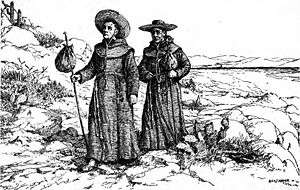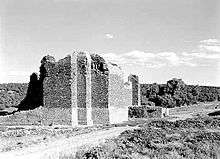Spanish missions in New Mexico
The Spanish Missions in New Mexico were a series of religious outposts in the Province of Santa Fe de Nuevo México — present day New Mexico. They were established by Franciscan friars under charter from the monarchs of the Spanish Empire and the government of the Viceroyalty of New Spain in a policy called Reductions to facilitate the conversion of Native Americans—Indians into Christianity.
Part of a series on |
| Spanish missions in the Americas of the Catholic Church |
|---|
 |
| Missions in North America |
| Missions in South America |
| Related topics |
|
|
History

They attempted to Hispanicize the indigenous peoples. The affected included the rich cultures and tribes of: many of the 21 distinct Puebloan groups; the Tiwa; the Navajo; and the Apache. The missions also aimed to pacify resistance to the European invasion of the tribes' Pre-Columbian homelands and loss of traditions. The missions introduced European livestock, fruits, vegetables, and small-scale industry into the Southwest region. They also introduced European diseases that the native people had no immunity against.
Fray Marcos de Niza, sent by Coronado, first saw the area now known as New Mexico in 1539. The first permanent settlement was Mission San Gabriel, founded in 1598 by Juan de Oñate near what is now known as the San Juan Pueblo.
Missions
- Nuestra Señora de la Asunción de Zía, Zia
(est. 1598 as San Pedro y San Pablo; destroyed 1680; rededicated 1692; Church built between 1706 and 1760)
(est. 1598; destroyed 1680; re-est. 1692; Church built 1694-96; Second church built 1706-44; abandoned 1838)
- Mission Nuestra Señora de Purísima Concepción de Quarai founded in the 17th century, ruins are part of the Salinas Pueblo Missions National Monument[1]
- Mission San Agustín de la Isleta - Built in 1612.[2] See also Isleta Pueblo
- Mission San Buenaventura de Cochití in Cochiti Pueblo - Completed in 1628, renovated in the 1960s. See also Cochiti Pueblo
- Mission San Estévan del Rey de Ácoma - Established 1629 and completed in 1641, in continuous use since.[3] — see also Acoma Pueblo.
- Mission San Felipe in San Felipe Pueblo - Built on the site of a previous church (1706)
- Mission San Gregorio de Abó - Established in 1640 by Fray Francisco Acevedo. Ruins are now part of the Salinas Pueblo Missions National Monument.[4]
- Mission San Ildefonso in San Ildefonso Pueblo - The original mission church was built in 1711, but was later destroyed. In 1968, a replica of this church was rebuilt[5]
- Mission San Isidro and Mission San Buenaventura de Humanas (Gran Quivira) - the ruins are part of the Salinas Pueblo Missions National Monument[6]
- Mission San José de los Jémez in Jémez Springs - Established in 1621, now in ruins.[7]
- Mission Nuestra Señora de Perpetuo Socorro, today known as the Mission San Miguel - Established in 1598 by Fray Alfonso Benavidez and another Franciscan friar. San Miguel Mission Chapel is said to be the oldest church still in use in the United States.
- Mission San José de Laguna in Laguna - built in 1699.[8] See also Laguna Pueblo
- Mission San Lorenzo de Picurís in Picurís — established circa 1620.
- Mission Santa Ana - Completed in 1750.[9]
- Mission Santo Domingo in Santo Domingo Pueblo - The original mission church was destroyed by flooding of the Rio Grande.[10]
- San Francisco de Asís Mission - Ranchos de Taos
- San Miguel Mission - Santa Fe
- Mission La Purísima Concepcíón de Hawikuh - Established in 1628, destroyed in 1680.
- Mission Nuestra Señora de Guadalupe de Zuñi - Still in use.
Noted churches that were not missions
- El Santuario de Chimayó - Site of an Easter pilgrimage by foot to this holy spot every year. Not a mission; founded c.1810 as a private chapel.
- San Francisco de Asís Mission Church - Church built between 1772 and 1816 and is located in the historic district of Ranchos de Taos.
- Santuario de Nuestra Señora de Guadalupe - Founded c. 1777; believed to be nation's oldest shrine dedicated to Our Lady of Guadalupe. Not a mission.
See also
| Wikimedia Commons has media related to New Mexico missions. |
External links
- The Old Missions of New Mexico, 1998 article, St. Anthony Messenger
- Sunlight and Adobe - Photographing New Mexico's Historic Missions New Mexico Photography Field School
- History, Archdiocese of Santa Fe
- Salinas Pueblo Missions National Monument
- Spanish Mission Churches of New Mexico, 1915 book by L. Bradford Prince
- Gran Quivira: A Blending of Cultures in a Pueblo Indian Village, a National Park Service Teaching with Historic Places (TwHP) lesson plan
References
- "Mission Nuestra Señora de Purísima Concepción de Quarai".
- Frank D. Reeve,History of New Mexico, Volume 1.Lewis Historical Publishing Co.1961
- Images of Acoma and San Estevan, Acoma, New Mexico
- "Abo Pueblo and San Gregorio Mission".
- "Books of the Southwest - University of Arizona Library".
- "Mission San Buenaventura de Humanas".
- "Mission San José de los Jémez".
- "San José de Laguna".
- "Mission Santa Ana". newmexico.org.
- "Mission Santo Domingo".
